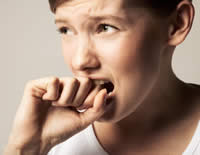Difference between Anxiety and Depression
Key Difference: Anxiety is a feeling of fear, unease, and worry. It can be rooted in any event that makes one feel frustrated, angry, or nervous. Depression is defined as a state of low mood and aversion to activity.
Anxiety and depression are two different medical conditions that a person can deal with. Anxiety is a response to a stressor and can be short-lived and even sometimes healthy for a person, however depressions is a more serious condition in which a person goes into a low state, which can affect the person’s daily life. These two are distinctly different from each other.
 Anxiety is a response to a stressor. You feel anxious when you are stressed, for example when you have to take a test or give an interview, etc. Anxiety is a feeling of fear, unease, and worry. It can be rooted in any event that makes one feel frustrated, angry, or nervous. The word ‘anxiety’ has been derived from the Latin word ‘anxietātem’, meaning “distressed or troubled.”
Anxiety is a response to a stressor. You feel anxious when you are stressed, for example when you have to take a test or give an interview, etc. Anxiety is a feeling of fear, unease, and worry. It can be rooted in any event that makes one feel frustrated, angry, or nervous. The word ‘anxiety’ has been derived from the Latin word ‘anxietātem’, meaning “distressed or troubled.”
In small doses, it is healthy and useful, as it makes one alert and able to deal with the stressor. Usually when the stressor is removed or it is dealt with, the anxiety ends, sometimes it doesn’t, which can lead to anxiety disorders. There are various different types of anxiety including existential anxiety, test and performance anxiety, stranger and social anxiety, generalized anxiety, trait anxiety, choice or decision anxiety and paradoxical anxiety.
The most common symptoms of anxiety include a faster heart rate, skipped heartbeats, rapid breathing, cold sweat, nausea, trembling and dizziness. If the anxiety worsens, the symptoms may also include loose stools, frequent urination, dry mouth and problems swallowing. Feelings of anxiety are common in people who feel depressed and sad. Also, major life changes may bring on anxiety. These can include starting a new job or school, moving away, an upcoming marriage, having children, break-ups or divorce.

On the other hand, depression is defined as a state of low mood and aversion to activity. This is usually caused by a biochemical imbalance in brain, which hamper the nerve cells’ ability to communicate with each other. These cells communicate using chemicals called neurotransmitters, some of which help maintain moods. If there is a deficiency in these chemicals, the person can experience depression. There are various different types of depression, which can range from minor to major including Clinical depression, chronic depression, Atypical Depression, Bipolar Depression (Manic Depression), Seasonal Depression (SAD) and Psychotic Depression.
Usually, a person would feel down or blue for a time being while the brain corrects the imbalance. However, if the imbalance continues, the depression could get worse. One might even need to take medication to correct the imbalance. Symptoms of depression include low energy, a loss of interest in normal activities, change in appetite, weight gain or weight loss, excessive sleep, insomnia, and the loss of ability to concentrate. Continued stress can also bring on depression. Depression can have some severe consequences, such as an impact on personal relationships, job performance, and can cause physical deterioration through lack of care. A person with depression will usually feel extremely lonely, pessimistic and might even think about committing suicide.
|
|
Anxiety |
Depression |
|
Definition |
Anxiety is a psychological and physiological state characterized by somatic, emotional, cognitive, and behavioral components. |
Depression is a condition that causes people to be in a state of low mood. This state affects the person’s daily activities. |
|
Symptoms |
Heart palpitations, tachycardia, muscle weakness and tension, fatigue, nausea, chest pain, shortness of breath, headache, stomach aches, or tension headaches. |
Low energy, a loss of interest in normal activities, change in appetite, weight gain or weight loss, excessive sleep, insomnia, and the loss of ability to concentrate. |
|
Causes |
According to recent studies, anxiety serves the purpose of increased vigilance regarding potential threats in the environment as well as increased tendency to take proactive actions regarding such possible threats. It is believed that a high amount of caffeine in a person’s body can cause or aggravates anxiety disorders. |
Depression is caused by a number of factors in a person’s life. Some known causes include abuse, certain medications, conflict, death or a loss, genetics, major changes, personal problems, serious illnesses and substance abuse. |
|
Types |
Existential anxiety, test and performance anxiety, stranger and social anxiety, generalized anxiety, trait anxiety, choice or decision anxiety and paradoxical anxiety. |
Clinical depression, chronic depression, Atypical Depression, Bipolar Depression (Manic Depression), Seasonal Depression (SAD) and Psychotic Depression. |
|
Treatment |
Avoid moving from one phase to another, avoid the need for a hospital stay, help the patient function as well as possible between episodes, prevent self-injury and suicide and make the episodes less frequent and severe. |
Depending on the worseness of the depression, it can be treated through medicines, therapy and various other measures. |
Image Courtesy: jfcsmonmouth.org, tribune.com.pk









Add new comment